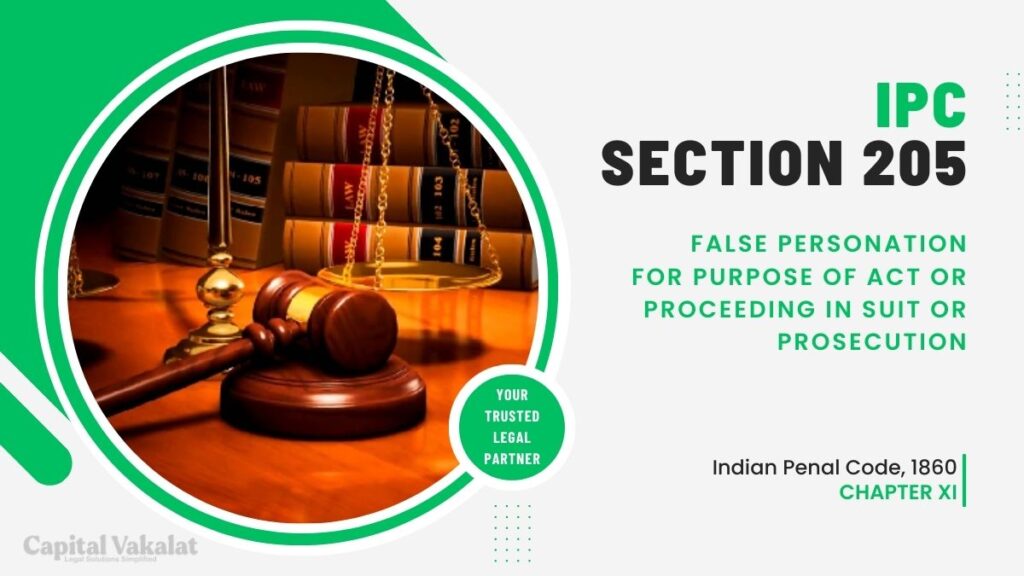False personation for the purpose of an act or proceeding in a suit or prosecution is a serious legal offense covered under Section 205 of the Indian Penal Code (IPC). This provision plays a crucial role in maintaining the integrity of the legal system in India.

In this comprehensive article, we will delve into the various aspects of Section 205 IPC, including its definition, elements, punishments, and much more.
Introduction to Section 205 IPC
To begin, let’s explore the core of Section 205 IPC. This section primarily deals with false personation, a practice where an individual impersonates another with the intent to deceive and influence an act or proceeding in a suit or prosecution.
Understanding False Personation
False personation involves assuming the identity of another person, living or deceased, and acting as if one were that person. It can encompass various forms, from forging signatures to adopting a pseudonym in legal matters. The underlying aim is to mislead or deceive others.
The Purpose of False Personation
Now, let’s examine why individuals resort to false personation. In many cases, it’s to gain an unfair advantage, whether for personal gain, to escape legal consequences, or to hinder a legal process. Understanding the motives behind false personation is crucial for effectively addressing this issue.
Elements of Section 205 IPC
Section 205 IPC outlines specific elements that need to be satisfied to establish an offense. These elements typically include the intent to deceive, a false assumption of another’s identity, and the involvement of a legal act or proceeding.
Punishments for Violating Section 205 IPC
To deter false personation, Section 205 IPC prescribes penalties for those found guilty. Depending on the gravity of the offense, punishments may range from fines to imprisonment. It’s essential to understand these consequences for both potential perpetrators and the legal authorities.
Relevant Case Laws
To illustrate the practical implications of Section 205 IPC, we will examine some relevant case laws that have shaped its interpretation and application in Indian jurisprudence.
Importance of Identifying False Personation
Recognizing false personation is crucial to maintain the integrity of legal proceedings. It ensures that judgments are based on true identities and facts, fostering fairness in the justice system.
Differences from Other Legal Provisions
Section 205 IPC distinguishes itself from other legal provisions concerning impersonation. It is essential to understand these distinctions to navigate the complexities of legal matters effectively.
How to Prove False Personation
Establishing false personation in a court of law requires presenting compelling evidence. This section will discuss the key aspects of proving such cases, including witness testimonies and documentary evidence.
Legal Defenses in Section 205 IPC Cases
In certain situations, individuals accused of false personation may have valid legal defenses. It’s essential to be aware of these defenses to ensure a fair trial.
Reporting False Personation
Reporting false personation is a responsibility that falls on both individuals and authorities. Understanding the reporting process is essential to bringing offenders to justice.
The Role of the Police and Courts
This section explores the respective roles of the police and the courts in handling cases involving Section 205 IPC violations. It sheds light on the investigative and judicial processes.
Conclusion
In conclusion, Section 205 IPC serves as a critical legal provision to combat false personation in legal matters. Its provisions and punishments are designed to maintain the sanctity of the legal system. Understanding the intricacies of this section is essential for both legal practitioners and the general public.
Remember, understanding and adhering to Section 205 IPC is crucial for ensuring justice and fairness in the legal system. False personation can have far-reaching consequences, making it essential to be well-informed about its provisions and implications.
Now, let’s address some common questions related to Section 205 IPC:
Frequently Asked Questions
Are there any specific legal precedents that have influenced Section 205 IPC cases?
Yes, various case laws have played a significant role in shaping the interpretation and application of this provision in Indian courts.
How can one report a case of false personation under Section 205 IPC?
Reporting such cases typically involves approaching the local police station and providing evidence of the offense.
What are the possible punishments for violating Section 205 IPC?
Penalties for this offense can include fines and imprisonment, depending on the seriousness of the false personation.
Is Section 205 IPC applicable only to individuals, or does it cover entities as well?
Section 205 IPC primarily deals with individuals engaging in false personation. However, it’s essential to consult with legal experts for specific cases involving entities.